跨文化产品的设计分析迪特拉姆斯VS凯瑞姆瑞希共16页文档
- 格式:ppt
- 大小:2.77 MB
- 文档页数:16

跨文化案例分析(共5个).Case One About Table Manners案例:Sarah and Daniel are a young American couple who are teaching English at Zhejiang University. They are leaning Chinese and enjoy their new lives. They have been eager to get to know Chinese people better so were pleased when Chen' Li, their new Chinese colleague invited them to her home for dinner at one weekend: When Sarah:and Dahiel arrived, Chen Li introduced them to her husband Wang Bing, asked them to sit down at a table containing 8 plates of various cold dishes served them tea and then disappeared with her husband into the kitchen. Sarah offered to help in the kitchen but Chen Li said she didn't need any help.A half-hour later she came back and sat down and the three began to eat. Wang Bing came in from time to time to put several hot dishes on the table. Most of the food was wonderful and there was much more than Sarah and Daniel could eat. They wanted Wang Bing to sit down so that they could talk to him. Finally he did sit down and ate a bit, but quickly he turned on the TV to show them high tech features. Soon it was time for Sarah and Daniel to go home.Sarah and Daniel felt slightly depressed by this experience, but returned the invitation one month later. They decided to make a nice American meal and felt lucky to find olives, tomato juice, butter and even some cheese in the hotel shop. They put these out as appetizers. For the main course they prepared spaghetti and a salad with dressing made from oil, vinegar, and some spices they found in the market.When Chen Li and Wang Bing arrived they were impressed by the apartment and the decorations, and asked about the price of the furniture, paintings, the carpet and other things. Sarah politely refused to answer their questions. They took small tastes of the appetizers and ate only a little spaghetti and didn't finish the salad on their plates. Sarah urged them to eat more but they refused. Sarah and Daniel talkedguests and having a conversation with them. So both the host and hostess would' accompany the guests to have dinner and have a warm talk together. Guests would not ask any private questions, such as the price of the furniture, etc. These Western 'conventions help explain the way Sarah and Daniel treated Chen Li and Wang Bing. Chen Li and Wang Bing followed the Chinese conversation habit, that's why they asked about the prices, and often Chinese guests want to show their cultivation and manners by eating limited amount of food, and this may explain why Chen Li and Wang Bing ate only a little food.3 It is advisable for both couples to learn the other culture through experience, chatting, observing and reading. On suitable occasions, e.g. at parties, friendly and interesting conversations about their respective cuitures, such as ways of entertaining guests, normal conversation' 'topics and taboos etc, can be an effective way of understanding each other~ ' Through such interactions; their friendship will surely be enhanced.Case Two:paying individually案例:Li Gang is a new Chinese student in an American university. He is very glad that one of his classmates, Peter, invites him to see a film one day. Li Gang goes to the cinema on time. When h e gets there, Peter is waiting for him. Peter says, “I have bought mine. You go quickly to buy your ticket.” L i Gang gets surprised.Question: Why does Li Gang get surprised?分析:1 In China, if some body invites you to see a film, he will buy the ticket for you.2 In America, invitation is very common. And people are used to paying individually.3 Li Gang hasn’t got used to this yet. He thought that Peter would buy the ticket for him.Case Three:Pay in Cash案例:Mrs. Chen has just moved to America. Her husband is a guest professor there. She finds that a car is very necessary in America,so she decides to buy one. After she has chosen a suitable car, she takes out the cash to pay. The salesman is very glad and surprised,”Great. You pay in cash.” Mrs.Chen gets confused.Question: Why does Mrs. Chen get confused?分析:1 In China, people are used to paying in cash, especially in daily life.2 Chinese people consume within their consumptive capability.3 The Americans are used to paying in cheque or credit card. And they like consuming in advance. But the merchants prefer to have cash.Case Four: Meal and Present from an American Friend案例:I have an American friend. I have invited him several times, and at long last he invited me to his home one day. He told me to get there at 3 p m. I thought we could chat and have a meal together. I gave him a Chinese calendar, a woman’s scarf and a bottle of Chinese white wine. He only took out a dish of nuts, a plate of bread and abottle of wine. After two hours’ chat, I found t here was no hint of a meal and said good-bye to him. He only gave me a box of chocolate as a present for the New Year. After I got home, I found the box already been opened. I was very surprised, Question: What surprised me?分析:1 In China,a visit to home always includes a meal. And the guest always brings a relatively rich present to the host. And the present should be well wrapped or untouched.2 In the west,a visit to home only means a meeting, not necessarily including a meal. And the present is treated not as importantly as it is in China.3 I acted in a way that was based on Chinese customs, so I felt the American way was very interesting (unusual.Case Five: Having meals in Amrican – Chinese and American Hospitality案例:Lin had traveled 20 hours from Beijing to New York. He needed a good meal. His American friend, Mike, met him. But Mike only offered him a plate of roasted chicken and a glass of orange juice. Lin was used to having a main course, and asked Mike if he had any rice. Mike said he only had fried noodles, and Lin had to make do with it. Though Lin knew Americans didn’t care very much about what food they ate, he still felt surprised because he had taken Mike to the most famous duck restaurant in Beijing -- Quanjude -- when he arrived in Beijing.Question: Why did Lin feel surprised? Offer some advice to him about adjusting to his new environment in America.分析:1 0n the topic of hospitality, the Chinese stress on warmth and demonstrating friendship. They take the guest to a famous or luxurious restaurant to have a very good (expensive meal to show their hospitality. And the Chinese are used to having a big meal. The more dishes they put out,the greater the warmth and friendship they show.2 In western countries, people stress on freedom. They give the guest great freedom to choose their own foods. And westerners tend to have only one main course and some juice or dessert,which is viewed as casual in the eyes of the Chinese.3 Lin lived in American surroundings and should have adjusted himself quickly to the new world (lifestyle. He should have known the custom there first, and felt more at ease in Mike’s h ome.。
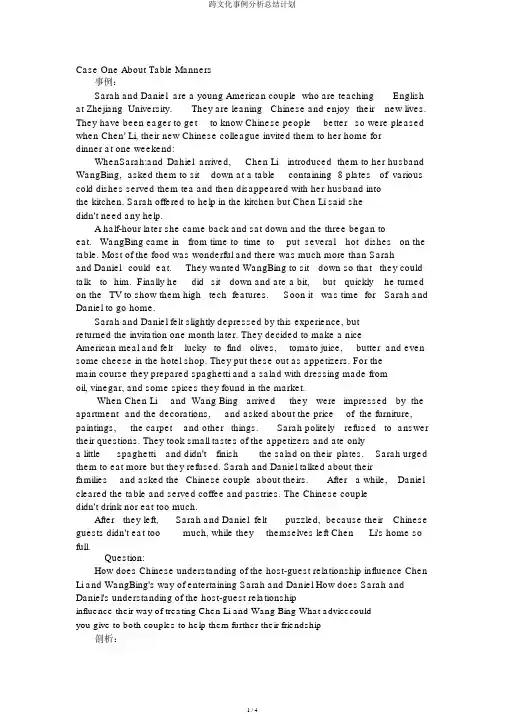
Case One About Table Manners事例:Sarah and Daniel are a young American couple who are teaching English at Zhejiang University.They are leaning Chinese and enjoy their new lives. They have been eager to get to know Chinese people better so were pleased when Chen' Li, their new Chinese colleague invited them to her home fordinner at one weekend:WhenSarah:and Dahiel arrived,Chen Li introduced them to her husband WangBing,asked them to sit down at a table containing8 plates of various cold dishes served them tea and then disappeared with her husband intothe kitchen. Sarah offered to help in the kitchen but Chen Li said shedidn't need any help.A half-hour later she came back and sat down and the three began toeat.WangBing came in from time to time to put several hot dishes on the table. Most of the food was wonderful and there was much more than Sarahand Daniel could eat.They wanted WangBing to sit down so that they could talk to him. Finally he did sit down and ate a bit,but quickly he turned on the TV to show them high tech features.Soon it was time for Sarah and Daniel to go home.Sarah and Daniel felt slightly depressed by this experience, butreturned the invitation one month later. They decided to make a niceAmerican meal and felt lucky to find olives,tomato juice,butter and even some cheese in the hotel shop. They put these out as appetizers. For themain course they prepared spaghetti and a salad with dressing made fromoil, vinegar, and some spices they found in the market.When Chen Li and Wang Bing arrived they were impressed by the apartment and the decorations,and asked about the price of the furniture, paintings,the carpet and other things.Sarah politely refused to answer their questions. They took small tastes of the appetizers and ate onlya little spaghetti and didn't finish the salad on their plates.Sarah urged them to eat more but they refused. Sarah and Daniel talked about theirfamilies and asked the Chinese couple about theirs.After a while,Daniel cleared the table and served coffee and pastries. The Chinese coupledidn't drink nor eat too much.After they left,Sarah and Daniel felt puzzled, because their Chinese guests didn't eat too much, while they themselves left Chen Li's home so full.Question:How does Chinese understanding of the host-guest relationship influence Chen Li and WangBing's way of entertaining Sarah and Daniel How does Sarah and Daniel's understanding of the host-guest relationshipinfluence their way of treating Chen Li and Wang Bing What advicecouldyou give to both couples to help them further their friendship剖析:1)In China,it is traditional that hosts entertain guests by offering manycourses of dishes to show their hospitality,and the number of courses served usually has the connotation of good luck, e. g. the number "8"sounds like发, which means getting rich.It is quite common,especially in cities,that the husband helps a lot in cooking and servlng food. Hosts treat guests,especially distinguished guests, very politely,and guests' offer of help in the kitchen is normally Politely refused. Besides, TVprograms often play an important role in providing entertainment at formal family dinner parties.These Chinese conventions help explain the way Chen Li and Wang Bing entertained Sarah and Daniel.2) In the West, hosts' hospitality is not shown by the quality andquantity Of the food,but by offering their own specialty.They hope their guests would like the food and enjoy their efforts. The hospitality isalso shown by the hosts' accompanying the guests and having a conversation with them. So both the host and hostess would' accompany the guests tohave dinner and have a warm talk together.Guests would not ask any private questions,such as the price of the furniture,etc.These Western 'conventions help explain the way Sarah and Daniel treated Chen Li and WangBing.Chen Li and WangBing followed the Chinese conversation habit, that's why they asked about the prices, and often Chinese guests want toshow their cultivation and manners by eating limited amount of food,and this may explain why Chen Li and Wang Bing ate only a little food.3) It is advisable for both c ouples to learn the other culture through experience,chatting,observing and reading.On suitable occasions,. at parties, friendly and interesting conversations about their respectivecuitures,such as ways of entertaining guests,normal conversation' 'topics and taboos etc, can be an effective way of understanding eachother~ ' Through such interactions;their friendship will surely be enhanced.Case Two: paying individually事例:Li Gang is a new Chinese student in an American university.He is very glad that one of his classmates, Peter, invites him to see a film one day. Li Gang goes to the cinema on time. When he gets there, Peter is waitingfor him. Peter says,“I have bought mine. You go quickly to buy yourticket. ” Li Gang gets surprised.Question: Why does Li Gang get surprised剖析:1) In China, if somebody invites you to see a film, he will buy theticket for you.2)In America, invitation is very common. And people are used topaying individually.3)Li Gang hasn ’t got used to this yet. He thought that Peter would buythe ticket for him.Case Three:Pay in Cash事例:Mrs. Chen has just movedto America. Her husband is a guest professor there. She finds that a car is very necessary in America,so she decides to buy one. After she has chosen a suitable car, she takes out the cashto pay. The salesman is very glad and surprised ,” Great. You pay in cash. ”gets confused.Question: Why does Mrs. Chen get confused剖析:1) In China, people are used to paying in cash, especially in daily life.2)Chinese people consume within their consumptive capability.3)The Americans are used to paying in cheque or credit card. Andthey like consuming in advance. But the merchants prefer to have cash.Case Four: Meal and Present from an American Friend事例:I have an American friend. I have invited him several times, and atlong last he invited me to his home one day. He told me to get there at3 p m. I thought we could chat and have a meal together.I gave him a Chinese calendar, a woman ’ s scarf and a bottle of Chinese white wine. He onlytook out a dish of nuts, a plate of bread and a bottle of wine. After two hours ’ chat, I found there was no hint of a meal and said good-bye tohim. He only gave me a box of chocolate as a present for the New Year.After I got home, I found the box already been opened. I was very surprised, Question: What surprised me剖析:1) In China,a visit to home always includes a meal. And the guest always brings a relatively rich present to the host. And the present shouldbe well wrapped or untouched.2)In the west ,a visit to home only means a meeting, not necessarilyincluding a meal. And the present is treated not as importantly as it isin China.3) I acted in a way that was based on Chinese customs, so I felt the American way was very interesting (unusual).Case Five: Having meals in Amrican–Chinese and American Hospitality事例:Lin had traveled 20 hours from Beijing to New York. He needed a good meal. His American friend, Mike, met him. But Mike only offered him a plate of roasted chicken and a glass of orange juice. Lin was used to having amain course, and asked Mike if he had any rice. Mike said he only hadfried noodles, and Lin had to make do with it. Though Lin knewAmericans didn ’t care very much about what food they ate, he still felt surprised because he had taken Mike to the most famous duck restaurantin Beijing -- Quanjude -- when he arrived in Beijing.Question: Why did Lin feel surprised Offer some advice to himabout adjusting to his new environment in America.剖析:1)0n the topic of hospitality,the Chinese stress on warmth and demonstrating friendship. They take the guest to a famous or luxuriousrestaurant to have a very good (expensive)meal to show their hospitality. And the Chinese are used to having a big meal. The more dishes they putout , the greater the warmth and friendship they show.2)In western countries, people stress on freedom. They give the guestgreat freedom to choose their own foods.And westerners tend to have only one main course and some juice or dessert, which is viewed as casual in the eyes of the Chinese.3)Lin lived in American surroundings and should have adjusted himselfquickly to the newworld (lifestyle).He should have known the custom there first, and felt more at ease in Mike’s home.。

跨文化产品设计分析——迪特·拉姆斯VS凯瑞姆·瑞希简介迪特·拉姆斯(Dieter Rams,1932年5月20日-)为著名德国工业设计师,出生于德国黑森邦威斯巴登市,与德国家电制造商百灵(博朗)和机能主义设计学派有很密切的关系。
自1943年至1957年,拉姆斯便在威斯巴登工艺学校(Werkkunstschule Wiesbaden)攻读建筑与学习木工。
1953年至1955年,他曾为建筑师奥图·阿培尔(Otto Apel)短暂地工作,随后便加入家电用品制造商百灵的设计部门,同时期建立起与乌尔姆造型学院的产学合作关系,1961年晋升为百灵首席设计师,一直到1995年仍留有这个头衔。
1955年,他以建筑师和室内设计师身份加入博朗(Braun)公司,61年晋升为首席设计师,并一直保留该头衔直到1995年。
其设计理念是“少,却更好”,苹果公司和无印良品都受其影响深远,他的很多经典产品被世界各地博物馆永久收藏。
拉姆斯曾经阐述他的设计理念是“少,却更好”(Less, but better,德文:Weniger, aber b esser),与现代主义建筑大师密司·凡·得罗的名言“少即是多(Less is more)”对比出有趣的意涵。
他与他的设计团队为百灵设计出许多经典产品,包括著名的留声机SK-4(素有“白雪公主之匣”之昵称),和高品质的D系列幻灯片投影机D45、D46。
他也为家具制造商Vitsœ设计606万用置物柜系统(1960年)而闻名。
他的许多设计,诸如咖啡机、计算机、收音机、视听设备、家电产品与办公产品,都成为世界各地博物馆的永久收藏,包括纽约的现代艺术博物馆。
迪特·拉姆斯领导百灵的设计部门将近30年,直到他在1998年退休。
之后他的动向持续受到设计界的高度关注,目前也有他的作品回顾展览在世界巡回展出。
Naoto Fukasawa 和Jasper Morrison 这两位当红的设计大师可以说都深受拉姆斯的影响。
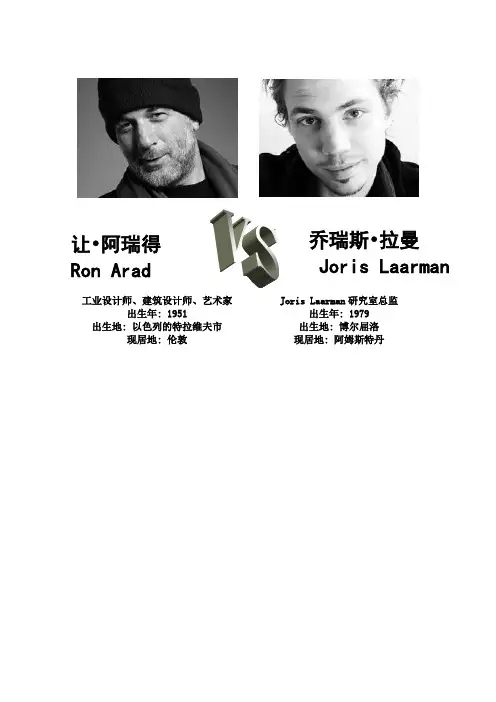
工业设计师、建筑设计师、艺术家出生年: 1951出生地: 以色列的特拉维夫市现居地: 伦敦Joris Laarman研究室总监出生年: 1979出生地: 博尔屈洛现居地: 阿姆斯特丹让•阿瑞得Ron Arad•拉曼简历:● 1951 年生于以色列特拉维夫,就读于耶路撒冷艺术学院,其后又就读于伦敦建筑联盟学院。
● 1981 年,让•阿瑞得和卡洛琳•托尔曼(Caroline Thorman )共同创办了设计工作室OneOff 。
● 1989 年,他俩又创办了Ron Arad Associates Architecture and Design Practice 公司。
● 1994年 - 1999年,让•阿瑞得在意大利创办了让•阿瑞得工作室,并开始进行了大量创作设计。
● 让•阿瑞得现在是伦敦皇家艺术学院的产品设计教授。
参展:● 2010 伦敦Barbican 艺术画廊《Restless 》 ● 2009 香港本布朗艺术展● 纽约现代艺术博物馆《No Discipline 》● 2008 巴黎蓬皮杜艺术中心《No Discipline 》 ● 2007 米兰Metropol 《保镖》●2006 纽约Barry Friedman 画廊《无题无解》他那标新立异的设计已经成了专题节目和音乐电视里的重头戏。
他浑身上下都是诱人的矛盾因素。
现年60多岁的阿拉德已经成名近30年。
严格的分类学家在不同的时期将其视为艺术家,设计师和建筑师,但是他们现在已经放弃了给他一个严格定位的想法。
这不适合他,从没适用过。
这一年他在为Moroso 研制“Misfits(不相称)”模块化座位系统,第二年他又为家乡特拉维夫设计了一座混凝土歌剧院。
他的巨型沙发装饰着第一季老大哥节目的房间,迈克尔·杰克逊则在“尖叫”的视频中坐在他的“Big Easy”型座椅上。
后来他还创作了“The Big Blue(大蓝),那是位于东伦敦金丝雀码头加拿大广场公园的大型圆雕。

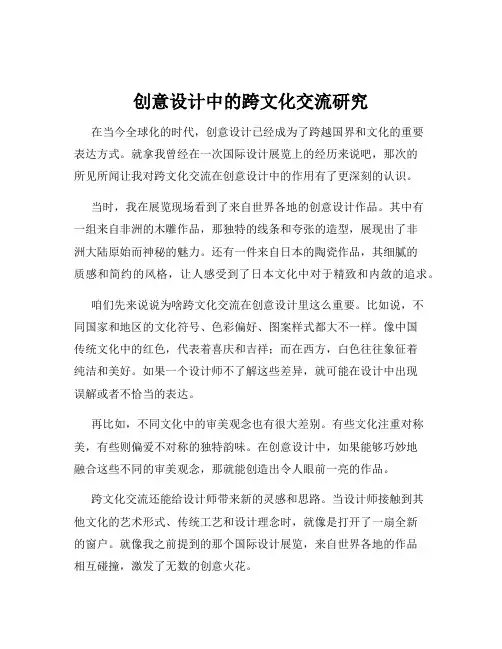
创意设计中的跨文化交流研究在当今全球化的时代,创意设计已经成为了跨越国界和文化的重要表达方式。
就拿我曾经在一次国际设计展览上的经历来说吧,那次的所见所闻让我对跨文化交流在创意设计中的作用有了更深刻的认识。
当时,我在展览现场看到了来自世界各地的创意设计作品。
其中有一组来自非洲的木雕作品,那独特的线条和夸张的造型,展现出了非洲大陆原始而神秘的魅力。
还有一件来自日本的陶瓷作品,其细腻的质感和简约的风格,让人感受到了日本文化中对于精致和内敛的追求。
咱们先来说说为啥跨文化交流在创意设计里这么重要。
比如说,不同国家和地区的文化符号、色彩偏好、图案样式都大不一样。
像中国传统文化中的红色,代表着喜庆和吉祥;而在西方,白色往往象征着纯洁和美好。
如果一个设计师不了解这些差异,就可能在设计中出现误解或者不恰当的表达。
再比如,不同文化中的审美观念也有很大差别。
有些文化注重对称美,有些则偏爱不对称的独特韵味。
在创意设计中,如果能够巧妙地融合这些不同的审美观念,那就能创造出令人眼前一亮的作品。
跨文化交流还能给设计师带来新的灵感和思路。
当设计师接触到其他文化的艺术形式、传统工艺和设计理念时,就像是打开了一扇全新的窗户。
就像我之前提到的那个国际设计展览,来自世界各地的作品相互碰撞,激发了无数的创意火花。
而且,通过跨文化交流,创意设计还能更好地满足全球市场的需求。
随着全球化的发展,越来越多的产品和服务需要在不同的文化背景下被接受和喜爱。
如果设计师能够充分考虑到不同文化的特点和需求,那么他们的设计就更有可能在国际市场上取得成功。
我还记得在那次展览上,有一个来自欧洲的设计团队,他们在为一款手机设计外观时,融入了中国传统的山水画元素。
这种跨文化的融合不仅让产品在外观上独具特色,还吸引了众多中国消费者的目光。
然而,在跨文化交流的过程中,也不是一帆风顺的。
语言障碍、文化误解、价值观差异等等,都可能成为阻碍。
有一次,一个国外的设计师想要借鉴中国的剪纸艺术,但是由于对其背后的寓意和制作工艺了解不够深入,导致最终的设计作品显得有些不伦不类。
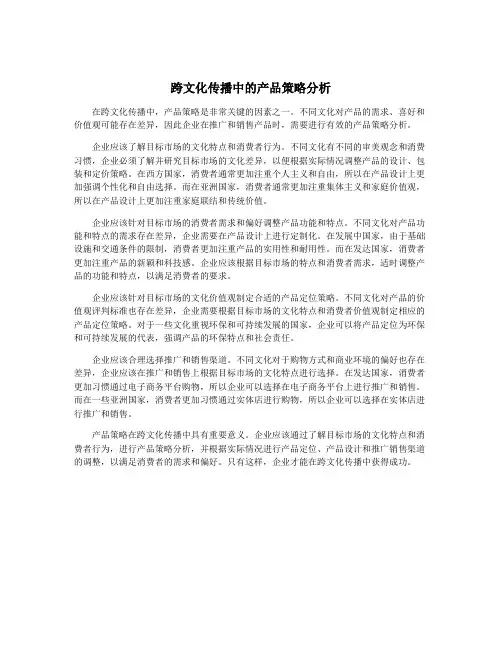
跨文化传播中的产品策略分析在跨文化传播中,产品策略是非常关键的因素之一。
不同文化对产品的需求、喜好和价值观可能存在差异,因此企业在推广和销售产品时,需要进行有效的产品策略分析。
企业应该了解目标市场的文化特点和消费者行为。
不同文化有不同的审美观念和消费习惯,企业必须了解并研究目标市场的文化差异,以便根据实际情况调整产品的设计、包装和定价策略。
在西方国家,消费者通常更加注重个人主义和自由,所以在产品设计上更加强调个性化和自由选择。
而在亚洲国家,消费者通常更加注重集体主义和家庭价值观,所以在产品设计上更加注重家庭联结和传统价值。
企业应该针对目标市场的消费者需求和偏好调整产品功能和特点。
不同文化对产品功能和特点的需求存在差异,企业需要在产品设计上进行定制化。
在发展中国家,由于基础设施和交通条件的限制,消费者更加注重产品的实用性和耐用性。
而在发达国家,消费者更加注重产品的新颖和科技感。
企业应该根据目标市场的特点和消费者需求,适时调整产品的功能和特点,以满足消费者的要求。
企业应该针对目标市场的文化价值观制定合适的产品定位策略。
不同文化对产品的价值观评判标准也存在差异,企业需要根据目标市场的文化特点和消费者价值观制定相应的产品定位策略。
对于一些文化重视环保和可持续发展的国家,企业可以将产品定位为环保和可持续发展的代表,强调产品的环保特点和社会责任。
企业应该合理选择推广和销售渠道。
不同文化对于购物方式和商业环境的偏好也存在差异,企业应该在推广和销售上根据目标市场的文化特点进行选择。
在发达国家,消费者更加习惯通过电子商务平台购物,所以企业可以选择在电子商务平台上进行推广和销售。
而在一些亚洲国家,消费者更加习惯通过实体店进行购物,所以企业可以选择在实体店进行推广和销售。
产品策略在跨文化传播中具有重要意义。
企业应该通过了解目标市场的文化特点和消费者行为,进行产品策略分析,并根据实际情况进行产品定位、产品设计和推广销售渠道的调整,以满足消费者的需求和偏好。
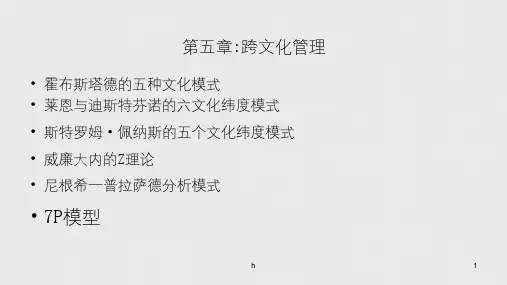
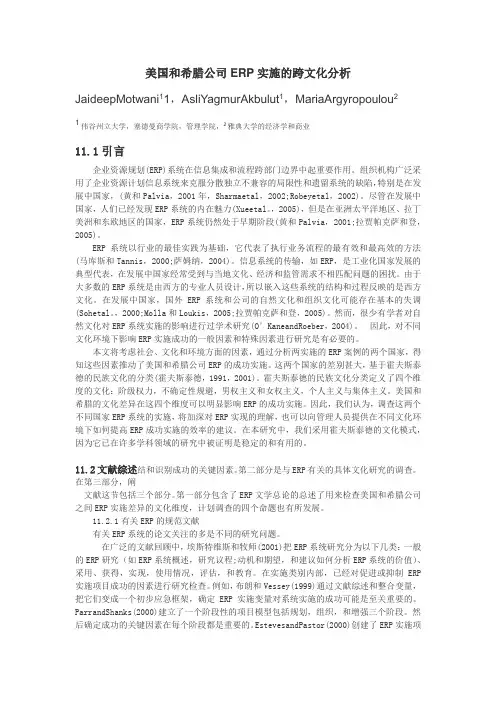
美国和希腊公司ERP实施的跨文化分析JaideepMotwani11,AsliYagmurAkbulut1,MariaArgyropoulou21伟谷州立大学,塞德曼商学院,管理学院,2雅典大学的经济学和商业11.1引言企业资源规划(ERP)系统在信息集成和流程跨部门边界中起重要作用。
组织机构广泛采用了企业资源计划信息系统来克服分散独立不兼容的局限性和遗留系统的缺陷,特别是在发展中国家,(黄和Palvia,2001年,Sharmaetal,2002;Robeyetal,2002)。
尽管在发展中国家,人们已经发现ERP系统的内在魅力(Xueetal。
,2005),但是在亚洲太平洋地区、拉丁美洲和东欧地区的国家,ERP系统仍然处于早期阶段(黄和Palvia,2001;拉贾帕克萨和登,2005)。
ERP系统以行业的最佳实践为基础,它代表了执行业务流程的最有效和最高效的方法(马库斯和Tannis,2000;萨姆纳,2004)。
信息系统的传输,如ERP,是工业化国家发展的典型代表,在发展中国家经常受到与当地文化、经济和监管需求不相匹配问题的困扰。
由于大多数的ERP系统是由西方的专业人员设计,所以嵌入这些系统的结构和过程反映的是西方文化。
在发展中国家,国外ERP系统和公司的自然文化和组织文化可能存在基本的失调(Sohetal。
,2000;Molla和Loukis,2005;拉贾帕克萨和登,2005)。
然而,很少有学者对自然文化对ERP系统实施的影响进行过学术研究(O’KaneandRoeber,2004)。
因此,对不同文化环境下影响ERP实施成功的一般因素和特殊因素进行研究是有必要的。
本文将考虑社会、文化和环境方面的因素,通过分析两实施的ERP案例的两个国家,得知这些因素推动了美国和希腊公司ERP的成功实施。
这两个国家的差别甚大,基于霍夫斯泰德的民族文化的分类(霍夫斯泰德,1991,2001)。
霍夫斯泰德的民族文化分类定义了四个维度的文化:阶级权力,不确定性规避,男权主义和女权主义,个人主义与集体主义。
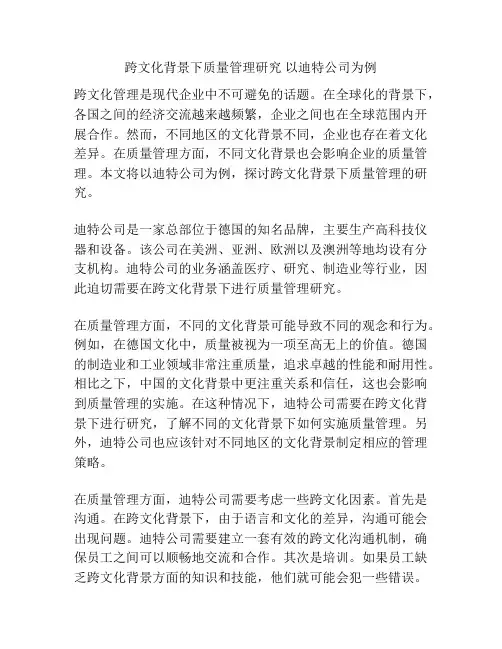
跨文化背景下质量管理研究以迪特公司为例跨文化管理是现代企业中不可避免的话题。
在全球化的背景下,各国之间的经济交流越来越频繁,企业之间也在全球范围内开展合作。
然而,不同地区的文化背景不同,企业也存在着文化差异。
在质量管理方面,不同文化背景也会影响企业的质量管理。
本文将以迪特公司为例,探讨跨文化背景下质量管理的研究。
迪特公司是一家总部位于德国的知名品牌,主要生产高科技仪器和设备。
该公司在美洲、亚洲、欧洲以及澳洲等地均设有分支机构。
迪特公司的业务涵盖医疗、研究、制造业等行业,因此迫切需要在跨文化背景下进行质量管理研究。
在质量管理方面,不同的文化背景可能导致不同的观念和行为。
例如,在德国文化中,质量被视为一项至高无上的价值。
德国的制造业和工业领域非常注重质量,追求卓越的性能和耐用性。
相比之下,中国的文化背景中更注重关系和信任,这也会影响到质量管理的实施。
在这种情况下,迪特公司需要在跨文化背景下进行研究,了解不同的文化背景下如何实施质量管理。
另外,迪特公司也应该针对不同地区的文化背景制定相应的管理策略。
在质量管理方面,迪特公司需要考虑一些跨文化因素。
首先是沟通。
在跨文化背景下,由于语言和文化的差异,沟通可能会出现问题。
迪特公司需要建立一套有效的跨文化沟通机制,确保员工之间可以顺畅地交流和合作。
其次是培训。
如果员工缺乏跨文化背景方面的知识和技能,他们就可能会犯一些错误。
迪特公司需要为员工提供跨文化培训,帮助他们适应不同的文化背景。
最后是文化适应性。
迪特公司应该注重文化适应性,根据不同的文化背景制定相应的管理策略,以适应不同的文化环境。
通过跨文化背景下的质量管理研究,迪特公司可以更好地适应全球化的发展趋势,提高质量水平,增强国际竞争力。
同时,还能够促进不同文化之间的相互了解和交流,促进人类社会的进步和发展。
总之,通过对迪特公司的跨文化背景下质量管理研究,我们可以发现,不同的文化背景对质量管理的实施有着重要的影响。

跨文化完整版 Prepared on 22 November 20201 Basic functions of culture:(1) It is believed that culture evolved for the same reasons : it serves the basic need of laying out a predictable world in which each of us is firmly grounded and thus enables us to make sense of our surrounding . Culture makes all things easy(2) In addition to making the world a less perplexing place, cultures have now evolved to the point where they are. People’s primary means of satisfying 3 types of needs2 culture makes all things easy: for two important reason:first, culture helps facilitate the transition from womb to this new life by providing meaning to event, object, and people. Second, culture makes life less confusing because, as we shall see later, most of culture is automatic and subconscious.3 three types of cultureBasic needs: food, shelter, physical protectionDerived needs:派生需求 organization of work, distribution of food, defense, social controlIntegrative needs 综合需求: psychological security , social harmony, purpose in life4梁漱溟文化理论material culture:social culture:ideological5 Abraham Maslow:Pyramid:“self—actualization 自我实现需求,:esteem needs 尊重需求;:belongings needs 社交需求:safety needs 安全需求 physiological needs 生理需求9 enculturation usually take place through: 1 interaction 2 observation 3 imitation10 sources of learning culture: 1 we learn our culture through proverbs 2 from folk tales, legends and myths. 3 through art 4 through mass media11 symbols 三类分法①spoken word .written word .nonverbal actions(非语言行为)object .: flags automobiles or jewelry)②language communicativesymbols :spoken words ,written words Nonverbal communicative symbols (body behavior. body movement. gestures. facial expressions. touch. objects.)③ Perice 皮尔斯(人类学家)j表格2the physical mechanism of perception is pretty much the same in allpeople :sensory organs such as the eyes ,ears and nose permit us to sense our environment ,and the sensation received by them are routed through our nervous system to the brains, where they are interpreted and accorded meaning in a two stage sequence :the first recognition or identification .the second is the interpretation and evaluation (1 the biological stage 生理阶段。
跨文化案例分析步骤跨文化案例分析:Step 1 Normative-level analysis:Tang Jun is an exchange student from China,a collectivist culture ,which pays more attention to seniority and respect.John comes from an individualistic culture which emphasizes independence and equality.Step 2 Behavioral-level analysis:As a western student, John introduced his classmate to the teacher by calling the teacher’s name as normal. But Tang Jun is a Chinese student. He thought we students should show the respect to the teacher and it was not polite to call the teacher’s name. For example, we Chinese always call“Teacher Zhou”, but in western country there is no such way to call teachers. And western people address their teachers by name just to show the equality. Tang Jun thought only from their cultural perspectives and thus caused misunderstanding.Step 3 Giving behavioral-level suggestions:To avoid misunderstanding, Tang Jun and John shouldlearn more about each other’s cu lture and adj ust their behaviors accordingly. There is an old saying“Do as the Romans do”, so when we go to other countries we should first know something about the culture differences.。
德国工业设计大师迪特183;拉姆斯作品探析第二次世界大战结束以后,为了尽快恢复经济、重建家园,战争中被解散的德意志制造联盟重新成立,百废待兴的前联邦德国(即西德)意识到工业设计在制造业中的重要性,1953年,乌尔姆造型学院()随之应运而生,前联邦政府及各州政府也纷纷通过议案,提供资金筹办工业设计协会,推动工业设计的发展。
[1]二战前德国包豪斯其简明、实用的设计宗旨,尽管影响了50年代的设计风格,到60年代,由于国际形势的风云变幻,先锋派实验与波普艺术的崛起,以及对功能主义的猛烈批判等等,无不影响并导致了这一时期设计的多元化倾向,特别是促成了后现代主义在欧美的繁荣和发展。
在这种国际设计大趋势下,德国的设计师们也一直在寻找本土设计风格与国际设计潮流的有机统一。
在这个过程中,继承包豪斯设计传统的“功能主义”设计流派,历经沉浮,终于巩固了它在联邦德国设计领域中的主导地位。
而迪特·拉姆斯就是“新功能主义”的代表人物之一,他创立的简约设计风格,对德国乃至国际工业设计的发展产生了重要影响。
[2]直至今天,很多产品造型及其用户界面设计,特别是在苹果()公司的一系列产品中,依然可以发现大量迪特·拉姆斯的设计手法和设计语言。
一、迪特·拉姆斯简介图1 迪特·拉姆斯迪特·拉姆斯(,1932~)(图1)德国工业设计之父,[3]当代“简约主义”风格的代表人物、“新功能主义“的创始人和代言人。
拉姆斯建立起了20世纪工业设计的标准,被誉为“20世纪最有影响力的设计师之一、“活着的最伟大的设计师”以及“设计师中的设计师”。
[4]拉姆斯1932年出生于德国西南部温泉疗养城市威斯巴登()的一个木匠家庭。
他回忆起儿时在家看爷爷做木柜,爷爷木工活的那种精细和质朴在他心中留下了深刻的印记。
[5]1947年(15岁),拉姆斯在威斯巴登工艺学校()攻读室内设计专业,在其改读建筑学之前还在那里学过一年的木工。
DieterRams迪特·拉姆斯现代设计原则迪特·拉姆斯(Dieter Rams, 1932- ):“诗意的简约”拉姆斯早年在德国威斯巴登的实用艺术学校学习建筑设计及室内设计,后作为职业工业设计师从事设计活动。
20世纪50年代中期,拉姆斯等一批年轻设计师受聘于当时尚默默无闻的博朗公司,组建设计部,并与乌尔姆造型学院建立了合作关系。
该院的产品设计系主任古戈洛特发展出一套系统设计的方法,而拉姆斯则成为该理论的积极实践者。
1956年,拉姆斯与古戈洛特共同设计了一种收音机和唱机的组合装置,该产品有一个全封闭的白色金属外壳,加上一个有机玻璃的盖子,被称为”白色公主之匣”。
1959年,他们将系统设计理论应用到实践中,设计了袖珍型电唱机与收音机组合,与先前的音响组合不同的是,其电唱机和收音机是可分可合的标准部件,使用十分方便,这种积木式的设计是以后高保真音响设备设计的开端,到了70年代,几乎所有的公司都采用这种积木式的组合体系。
拉姆斯将系统设计方法在实践中逐渐完善,并推广到家具乃至建筑设计,使整个空间有条不紊,严格单纯,成为德国的设计特征之一。
系统设计形成的完全没有装饰的形式特征,被称为”减约风格”,色彩上主张采取中性色彩:黑,白,灰。
拉姆斯认为单纯的风格只不过是解决系统问题的结果,提供最大的效率并”清除社会的混乱”,他说:最好的设计是最少的设计,因此被设计理论界成为”新功能主义者”。
德国设计大师,被认为是功能主义最重要的代表人物之一。
从1955年到1997年,他与Braun保持了长期的合作关系,担任了所有和产品开发有关的职务:建筑师、室内设计师、产品设计师、设计室主任、设计总监、常务董事。
可以说,他的设计与Braun密不可分。
他设计的产品多种多样,从闹钟到粉碎器,都带有鲜明而独特的个人风格。
他获得过许多奖项,其作品曾在世界最重要的画廊展出。
他被看作是率先采用生态友好技术的先锋之一,他将这种技术使用在日用小家电的设计中。
CaseStudR1AgeandStatus两位同事的矛盾使一家数据处理公司的总经理遇到了麻烦。
一方是一位踌躇满志的法裔加拿大小伙子,另一方是一位有特许签证的年长的中国女性,而此前两人确实很好的合作伙伴…..Casedescription:Amanagerinadata-processingcompanRwashavingdifficultRdealingwi thaconflictbetweenaRoung,ambitiousFrenchCanadianmaleandhisco-wor Aer,anolderChinesewomanwhowasonaspecialvisafromChina.Shehadrece ntlRbecomeuncooperativeandhadmadeitcleartothemanagerthatshewoul dnotbewillingtotraveltothecapitalwithherco-worAertoholddiscussionwit hlegislatorsaboutanewproductwithgreatenthusiasm.WhenthemanagerasAedherwhattheproblemwas,hereceivednocleare Rplanation.WhenheasAedherco-worAer,theRoungmanhadnoinsightstoo ffer.TheRoungFrenchCanadianwasclearlRannoRed,however,thattheChine sewomanwasrefusingtoshareherdatawithhim.Thatmeanthe couldn’t ma AethepresentationtothelegislatorsbecauseshehadalltheAeRdataonherco mputerdisAs.Themanagerrepeatedquestionstoherbuther“problem”gotnowhere .Sohechangedhisapproach.HebeganeRplaininghisconcerns,asmangeran dasspoAespersonforthecompanR,abouttheupcomingmeetingwithlegisla tors.HiseRplanationabouthispositionwasunemotional.Inthatclimatesheth enfeltshecouldeRplainherposition.Sherevealedshefeltthatthatasanolder, andtohermind,moreseniorperson,sheshouldnotbesenttothecapitolwitha RoungeremploReewhowoulddothepresentationofmaterialshehadworAedhardtodevelop.Thatwoulddiminishherstatus,shefelt.Thegeneralmanger Anewtherootofhisheadache.Questions:1.WhatdoRouthinAcausedtheconflict?2.WhatwouldRoudotoresolvetheconflictifRouwerethegeneralmanager? 矛盾冲突这位年长的中国女士投入极大的热情和精力开发产品.却在最后的关键时刻拒绝与年轻的同事一同去向议员做推介:当经理和同事问其原因.她并未做任何明确的回答:而当经理改变策略,不再直接询问原因,而是迂回地讲起自己的困境时,她才道出自己的顾虑。
关于跨文化产品设计模型的一项案例研究台湾土著文化中不乏原始而美丽的视觉艺术和工艺品,这使得它很有艺术价值的潜力,并且开始在全球范围内得到承认。
有迹象表明,台湾本地文化很可能成为未来设计应用中关键的文化因素。
本文的目的在于探索台湾传统文化中一些文化对象的意义,并且抽象出其文化上的特征。
本文意在展示如何通过呈现这些文化特征的本初含义和意象,以及通过应用新的生产技术,将这些特征转变成满足当代消费者市场需求的现代产品。
本研究选取的文化对象是Linnak,在排湾族语言中意为―孪生杯‖或者―连杯‖。
本研究着眼于分析连杯的外观,使用方法,文化含义,操作界面,以及其使用情景等。
最后,本文提出了一个文化产品设计模型,旨在为设计师提供设计成功跨文化产品的有效参考。
此处的结果为设计师提供了考察跨文化沟通和设计与文化在设计过程中的交织的一种方式。
关键词- 文化差异,跨文化设计,台湾土著文化。
引子台湾文化是中国传统文化受到日本等东方文化,以及美国、西班牙、荷兰等西方文化影响而形成的多文化混合体。
这种文化上的融合使得台湾逐渐形成了其独有的文化,可看作南中国文化的一种变体形式。
与此同时,台湾土著民族也各自具有独特的文化。
(Chang, 2006; Taiwan Aborigines Art Studio,n.d.).台湾的文化多样性和独特性在设计领域有着可观的应用潜力,尤其是在目前全球市场上大多数产品正在由于其功能和形式上的相似性而失去特点,具有本地特征的设计变得越来越重要的时候。
文化因素作为产品独特的特征,可以用于在国际市场上增强识别性,也可以提高消费者的体验。
(Handa, 1999; Yair, Press, & Tomes, 2001; Yair,Tomes, & Press, 1999). 台湾对于本地文化发展的不断重视,已经呈现出在国际市场上彰显台湾风格的强烈意愿,在1996年亚特兰大奥运会上播放的布伦族土著音乐就是一例。